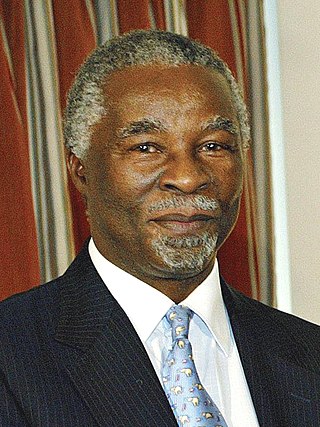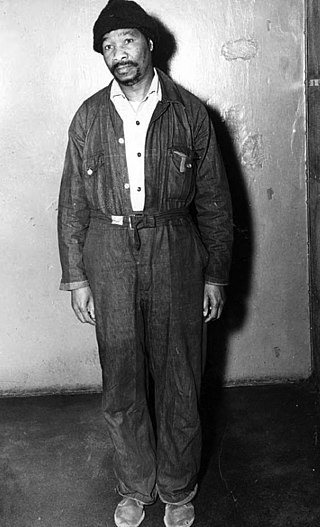
Thabo Mvuyelwa Mbeki is a South African politician who served as the 2nd democratic president of South Africa from 14 June 1999 to 24 September 2008, when he resigned at the request of his party, the African National Congress (ANC). Before that, he was deputy president under Nelson Mandela from 1994 to 1999.
The African Renaissance is the concept that the African people shall overcome the current challenges confronting the continent and achieve cultural, scientific, and economic renewal. This concept was first articulated by Cheikh Anta Diop in a series of essays between 1946 and 1960, later collected in a book titled Towards the African Renaissance. Diop's ideas were further popularized by former President of South Africa Thabo Mbeki during his tenure as Deputy President, where the African Renaissance continues to play a key role in the post-apartheid intellectual agenda.

Govan Archibald Mvunyelwa Mbeki was a South African politician, military commander, Communist leader who served as the Secretary of Umkhonto we Sizwe, at its inception in 1961. He was also the son of Chief Sikelewu Mbeki and Johanna Mahala and also the father of the former South African president Thabo Mbeki and political economist Moeletsi Mbeki. He was a leader of the South African Communist Party and the African National Congress. After the Rivonia Trial, he was imprisoned (1963–1987) on charges of terrorism and treason, together with Nelson Mandela, Walter Sisulu, Raymond Mhlaba, Ahmed Kathrada and other eminent ANC leaders, for their role in the ANC's armed wing, Umkhonto we Sizwe (MK). He was sometimes mentioned by his nickname "Oom Gov".

HIV/AIDS denialism is the belief, despite conclusive evidence to the contrary, that the human immunodeficiency virus (HIV) does not cause acquired immune deficiency syndrome (AIDS). Some of its proponents reject the existence of HIV, while others accept that HIV exists but argue that it is a harmless passenger virus and not the cause of AIDS. Insofar as they acknowledge AIDS as a real disease, they attribute it to some combination of sexual behavior, recreational drugs, malnutrition, poor sanitation, haemophilia, or the effects of the medications used to treat HIV infection (antiretrovirals).

General elections were held in South Africa on 2 June 1999. The result was a landslide victory for the governing African National Congress (ANC), which gained fourteen seats. Incumbent president Nelson Mandela declined to seek re-election as president on grounds of his age. This election was notable for the sharp decline of the New National Party, previously the National Party (NP), which without former State President F. W. de Klerk lost more than half of their former support base. The liberal Democratic Party became the largest opposition party, after being the fifth largest party in the previous elections in 1994. The number of parties represented in the National Assembly increased to thirteen, with the United Democratic Movement, jointly headed by former National Party member Roelf Meyer, and former ANC member Bantu Holomisa, being the most successful of the newcomers with fourteen seats.

The Treatment Action Campaign (TAC) is a South African HIV/AIDS activist organisation which was co-founded by the HIV-positive activist Zackie Achmat in 1998. TAC is rooted in the experiences, direct action tactics and anti-apartheid background of its founder. TAC has been credited with forcing the reluctant government of former South African President Thabo Mbeki to begin making antiretroviral drugs available to South Africans.

Jacob Gedleyihlekisa Zuma is a South African politician who served as the fourth president of South Africa from 2009 to 2018. He is also referred to by his initials JZ and clan names Nxamalala and Msholozi. Zuma was a former anti-apartheid activist, member of uMkhonto weSizwe, and president of the African National Congress (ANC) from 2007 to 2017.

The Directorate of Special Operations (DSO), commonly known as the Scorpions, was a specialised unit of the National Prosecuting Authority of South Africa formed by President Thabo Mbeki, tasked with investigating and prosecuting high-level and priority crimes including organised crime and corruption. An independent and multidisciplinary unit with a unique methodology which combined investigation, forensic intelligence, and prosecution, the Scorpions were known as an elite unit, and were involved in several extremely high-profile investigations, especially into the Arms Deal and into high-ranking African National Congress (ANC) politicians including Jackie Selebi, Jacob Zuma, and Tony Yengeni.

Angela Thokozile Didiza is a South African politician serving as Speaker of the National Assembly since 14 June 2024. A member of the African National Congress (ANC), she was formerly the Minister of Agriculture, Land Reform and Rural Development between May 2019 and June 2024. She served an earlier stint in the cabinet between 1999 and 2008.
William Mothipa Madisha is a South African trade unionist and politician. Madisha is the former President of both the Congress of South African Trade Unions and the South African Democratic Teachers Union . Madisha grew up in Atteridgeville, Pretoria, South Africa, where he was a member of the United Democratic Front. He studied teaching at Transvaal College of Education.

Kgalema Petrus Motlanthe is a South African politician who served as the 3rd president of South Africa from 25 September 2008 to 9 May 2009, following the resignation of Thabo Mbeki. Thereafter, he was deputy president under Jacob Zuma from 9 May 2009 to 26 May 2014.

South Africa since 1994 transitioned from the system of apartheid to one of majority rule. The election of 1994 resulted in a change in government with the African National Congress (ANC) coming to power. The ANC retained power after subsequent elections in 1999, 2004, 2009, 2014, and 2019. Children born during this period are known as the born-free generation, and those aged eighteen or older, were able to vote for the first time in 2014.
The 52nd National Conference of the African National Congress (ANC) was held in Polokwane, Limpopo, from 16 to 20 December 2007. At the conference, Jacob Zuma and his supporters were elected to the party's top leadership and National Executive Committee (NEC), dealing a significant defeat to national President Thabo Mbeki, who had sought a third term in the ANC presidency. The conference was a precursor to the general election of 2009, which the ANC was extremely likely to win and which did indeed lead to Zuma's ascension to the presidency of South Africa. Mbeki was prohibited from serving a third term as national President but, if re-elected ANC President, could likely have leveraged that office to select his successor.

The 24th South African Parliament was the third Parliament of South Africa to convene since the introduction of non-racial government in South Africa in 1994. It was elected in the 14 April, 2004 general election, and was opened by re-elected president Thabo Mbeki's State of the Nation address in a joint sitting on 21 May 2004. The composition of the parliament was only slightly changed by the 2007 floor crossing window period, with the ANC retaining its majority and the Democratic Alliance retaining its lead of the opposition. It held its final session in February 2009, prior to the April 2009 elections.
The Progressive ANC Voters Network (PAVN) is a sub-party voting bloc organization that was formed by AIDS activist Zackie Achmat and other card-carrying members of the African National Congress on March 28, 2007. It is meant to push for greater representation and furtherance of progressivist ideals within the party.
Nomaka Epainette Mbeki, commonly known as "MaMbeki", a stalwart community activist and promoter of women's development, mother of former President of South Africa Thabo Mbeki. and widow of political activist and Rivonia trialist, Dr. Govan Mbeki. She lived in Ngcingwane, a rural hamlet near Dutywa, one of South Africa's poorest municipalities. She was known for her auspicious relatives and, more importantly to her, her endeavours to improve the residents' quality of life. Gillian Rennie, in an award-winning profile, quoted a co-worker as saying, "She is not like other retired people, getting a pension and saying, 'Let me play golf and fish a bit.' The old lady is a humble person."

The Congress of the People (COPE) is a South African political party formed in 2008 by former members of the African National Congress (ANC). The party was founded by former ANC members Mosiuoa Lekota, Mbhazima Shilowa and Mluleki George to contest the 2009 general election. The party was announced following a national convention held in Sandton on 1 November 2008, and was founded at a congress held in Bloemfontein on 16 December 2008. The name echoes the 1955 Congress of the People at which the Freedom Charter was adopted by the ANC and other parties, a name strongly contested by the ANC in a legal move dismissed by the Pretoria High Court.
In South Africa, HIV/AIDS denialism had a significant impact on public health policy from 1999 to 2008, during the presidency of Thabo Mbeki. Mbeki criticized the scientific consensus that HIV is the cause of AIDS beginning shortly after his election to the presidency. In 2000, he organized a Presidential Advisory Panel regarding HIV/AIDS including several scientists who denied that HIV caused AIDS.
The minister in the presidency is a minister in the Cabinet of South Africa, appointed by the President of South Africa. The minister has general responsibility for portfolios in the Office of the President of South Africa. Some former Ministers in the Presidency have been assigned specific portfolios.










